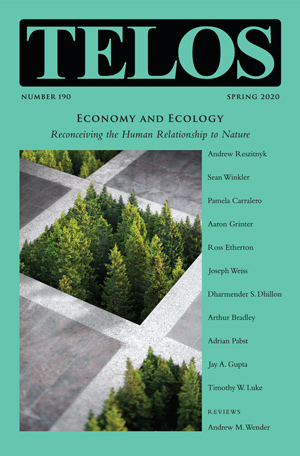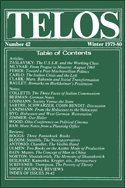By Joseph Weiss · Wednesday, April 22, 2020 Joseph Weiss’s “The Old in New Critical Theory: Locating the Gambler and the Prostitute in the Image of Neoliberalism” appears in Telos 190 (Spring 2020): Economy and Ecology: Reconceiving the Human Relationship to Nature. Read the full article at the Telos Online website, or purchase a print copy of the issue in our online store. Individual subscriptions to Telos are available in both print and online formats.
 This essay is part of a larger project that aims to trace the return of the old in “new” critical theory. It attempts to demonstrate how, after the failure of the second generation of the Frankfurt School to situate the ongoing antagonisms of neoliberal social relations, several of the concepts of the first generation weigh on the comportment of “new” critical theory. More specifically, by examining the figures of the gambler and the prostitute in relationship to Walter Benjamin and Theodor W. Adorno’s conception of the dialectical image, we observe just how much the critique of commodity fetishism, the use of rhetoric in historico-philosophical presentation, as well as the analysis of political economy and class relations, continue to assert themselves as pressing needs for social theory. In beginning to perform this “new” critical theory that heeds the dialectical tension between the past and present, an image of the unfulfilled desires at work in both the idea of communism and neoliberalism ultimately comes to the fore. Instead of undialectically discarding these figures as morally bankrupt or expressions of mere illusion and falsehood, we are called to capture the truth of their appearance, i.e., the ambivalent desire that promises submission to domination at the same time that it highlights an indispensable moment in the real possibility of emancipation. This essay is part of a larger project that aims to trace the return of the old in “new” critical theory. It attempts to demonstrate how, after the failure of the second generation of the Frankfurt School to situate the ongoing antagonisms of neoliberal social relations, several of the concepts of the first generation weigh on the comportment of “new” critical theory. More specifically, by examining the figures of the gambler and the prostitute in relationship to Walter Benjamin and Theodor W. Adorno’s conception of the dialectical image, we observe just how much the critique of commodity fetishism, the use of rhetoric in historico-philosophical presentation, as well as the analysis of political economy and class relations, continue to assert themselves as pressing needs for social theory. In beginning to perform this “new” critical theory that heeds the dialectical tension between the past and present, an image of the unfulfilled desires at work in both the idea of communism and neoliberalism ultimately comes to the fore. Instead of undialectically discarding these figures as morally bankrupt or expressions of mere illusion and falsehood, we are called to capture the truth of their appearance, i.e., the ambivalent desire that promises submission to domination at the same time that it highlights an indispensable moment in the real possibility of emancipation.
Continue reading →
By Aidin Keikhaee · Friday, January 6, 2017 In this essay I attempt to sketch out the possibility of a response to the problem of the relation between ethics and politics in Emmanuel Levinas’s philosophy. Levinas’s ethics as first philosophy is revolutionary, and promising, but it leads to a gap between ethics and politics. This is a genuine problem, since depending on how one problematizes this gap and responds to it, one may end up with different, even opposing, views of Levinas’s thought, ranging from the right side of the political spectrum to its very left. In order to respond to this problem, I examine the possibility of a constructive dialogue between Levinas’s ethics and Adorno’s negative dialectics. In particular, I approach the relation between ethics and politics in Levinas from the standpoint of the question of history.
Continue reading →
By Robert Wyllie · Tuesday, October 22, 2013 As an occasional feature on TELOSscope, we highlight a past Telos article whose critical insights continue to illuminate our thinking and challenge our assumptions. Today, Robert Wyllie looks at Alain Manville’s “Hegel and Metaphysics,” from Telos 42 (Winter 1979).
 In “Hegel and Metaphysics,” Alain Manville joins the echelon of French theorists who attempt to focalize Hegelianism around one core concept. In the vanguard, Jean Wahl turned unhappy consciousness into an organizing principle for reading Hegel. More famously, Alexandre Kojève pared Hegelianism down to the core master-slave dialectic. Manville focuses upon the annihilation of metaphysics in Hegel’s speculative recognition that being equals nothingness. Speculative thought transcends the understanding (Vernunft), which sees only an ontological contradiction. Hegel dismisses Vernunft and metaphysics, Manville argues, to grasp concrete reality in a postmetaphysical sense. In “Hegel and Metaphysics,” Alain Manville joins the echelon of French theorists who attempt to focalize Hegelianism around one core concept. In the vanguard, Jean Wahl turned unhappy consciousness into an organizing principle for reading Hegel. More famously, Alexandre Kojève pared Hegelianism down to the core master-slave dialectic. Manville focuses upon the annihilation of metaphysics in Hegel’s speculative recognition that being equals nothingness. Speculative thought transcends the understanding (Vernunft), which sees only an ontological contradiction. Hegel dismisses Vernunft and metaphysics, Manville argues, to grasp concrete reality in a postmetaphysical sense.
Continue reading →
By Telos Press · Monday, September 16, 2013 Karel Kosík and Dialectics of the Concrete Prague, June 4–6, 2014
A conference organised by the Department for the Study of Modern Czech Philosophy, Institute of Philosophy, Academy of Sciences of the Czech Republic.
In 1963 Karel Kosík published his path-breaking book Dialectics of the Concrete. It made an impact on both Marxist and non-Marxist thinkers, in Czechoslovakia and throughout the world. In this work Kosík set for himself an ambitious task—to re-think the basic concepts of the Marxist philosophical tradition and to employ them in the analysis of social reality. In the course of his analysis he touched on a wide array of issues that are still relevant today, including the problem of mystification or the “pseudo-concrete,” the social role of art, the conception of reality as a concrete totality, the conception of the human being as an onto-formative being, the systematic connection between labour and temporality, the relationship between praxis and labour, and the explanatory power of the dialectical method.
Continue reading →
|
|
 This essay is part of a larger project that aims to trace the return of the old in “new” critical theory. It attempts to demonstrate how, after the failure of the second generation of the Frankfurt School to situate the ongoing antagonisms of neoliberal social relations, several of the concepts of the first generation weigh on the comportment of “new” critical theory. More specifically, by examining the figures of the gambler and the prostitute in relationship to Walter Benjamin and Theodor W. Adorno’s conception of the dialectical image, we observe just how much the critique of commodity fetishism, the use of rhetoric in historico-philosophical presentation, as well as the analysis of political economy and class relations, continue to assert themselves as pressing needs for social theory. In beginning to perform this “new” critical theory that heeds the dialectical tension between the past and present, an image of the unfulfilled desires at work in both the idea of communism and neoliberalism ultimately comes to the fore. Instead of undialectically discarding these figures as morally bankrupt or expressions of mere illusion and falsehood, we are called to capture the truth of their appearance, i.e., the ambivalent desire that promises submission to domination at the same time that it highlights an indispensable moment in the real possibility of emancipation.
This essay is part of a larger project that aims to trace the return of the old in “new” critical theory. It attempts to demonstrate how, after the failure of the second generation of the Frankfurt School to situate the ongoing antagonisms of neoliberal social relations, several of the concepts of the first generation weigh on the comportment of “new” critical theory. More specifically, by examining the figures of the gambler and the prostitute in relationship to Walter Benjamin and Theodor W. Adorno’s conception of the dialectical image, we observe just how much the critique of commodity fetishism, the use of rhetoric in historico-philosophical presentation, as well as the analysis of political economy and class relations, continue to assert themselves as pressing needs for social theory. In beginning to perform this “new” critical theory that heeds the dialectical tension between the past and present, an image of the unfulfilled desires at work in both the idea of communism and neoliberalism ultimately comes to the fore. Instead of undialectically discarding these figures as morally bankrupt or expressions of mere illusion and falsehood, we are called to capture the truth of their appearance, i.e., the ambivalent desire that promises submission to domination at the same time that it highlights an indispensable moment in the real possibility of emancipation.  In “Hegel and Metaphysics,” Alain Manville joins the echelon of French theorists who attempt to focalize Hegelianism around one core concept. In the vanguard, Jean Wahl turned unhappy consciousness into an organizing principle for reading Hegel. More famously, Alexandre Kojève pared Hegelianism down to the core master-slave dialectic. Manville focuses upon the annihilation of metaphysics in Hegel’s speculative recognition that being equals nothingness. Speculative thought transcends the understanding (Vernunft), which sees only an ontological contradiction. Hegel dismisses Vernunft and metaphysics, Manville argues, to grasp concrete reality in a postmetaphysical sense.
In “Hegel and Metaphysics,” Alain Manville joins the echelon of French theorists who attempt to focalize Hegelianism around one core concept. In the vanguard, Jean Wahl turned unhappy consciousness into an organizing principle for reading Hegel. More famously, Alexandre Kojève pared Hegelianism down to the core master-slave dialectic. Manville focuses upon the annihilation of metaphysics in Hegel’s speculative recognition that being equals nothingness. Speculative thought transcends the understanding (Vernunft), which sees only an ontological contradiction. Hegel dismisses Vernunft and metaphysics, Manville argues, to grasp concrete reality in a postmetaphysical sense. 

